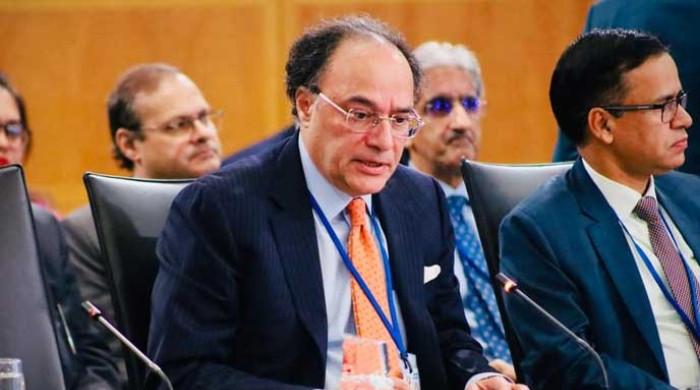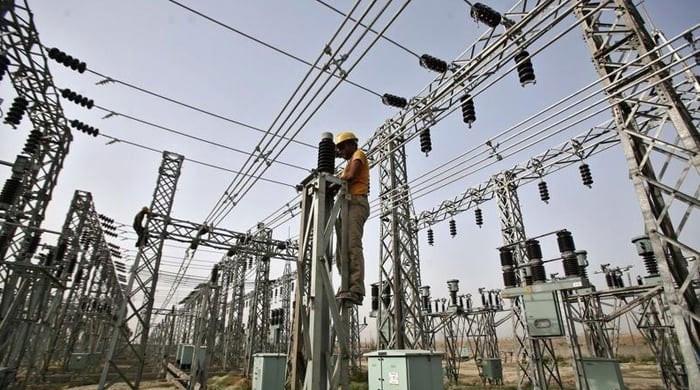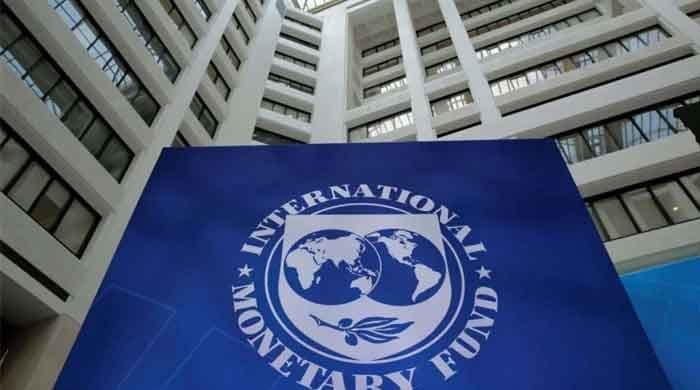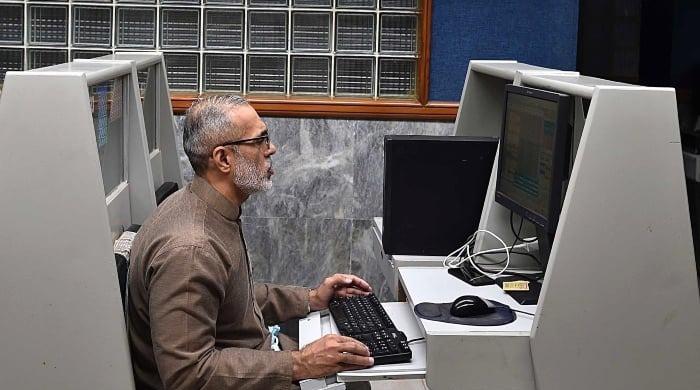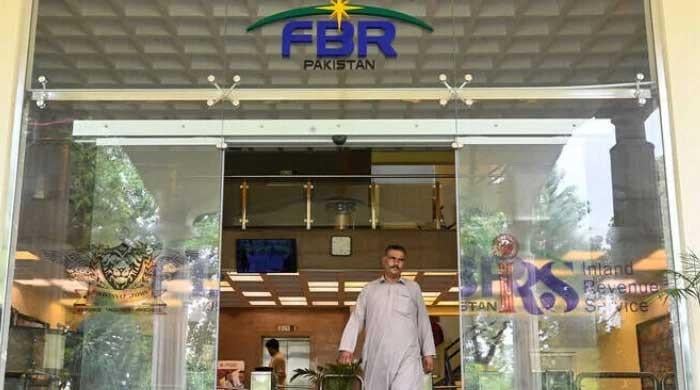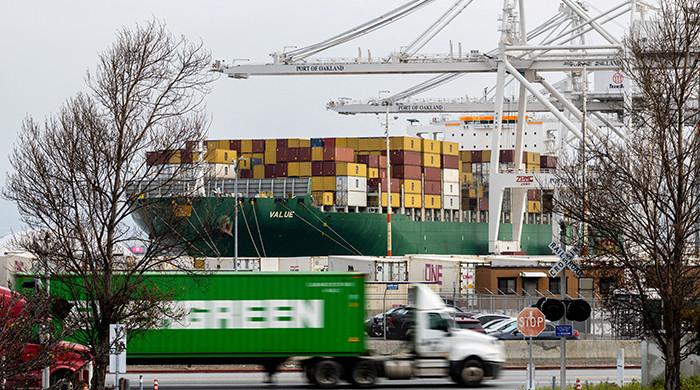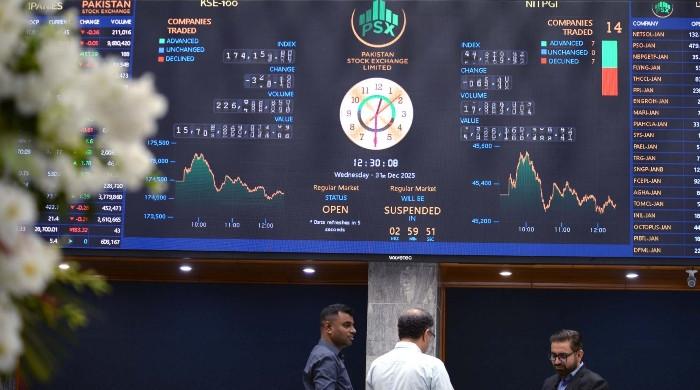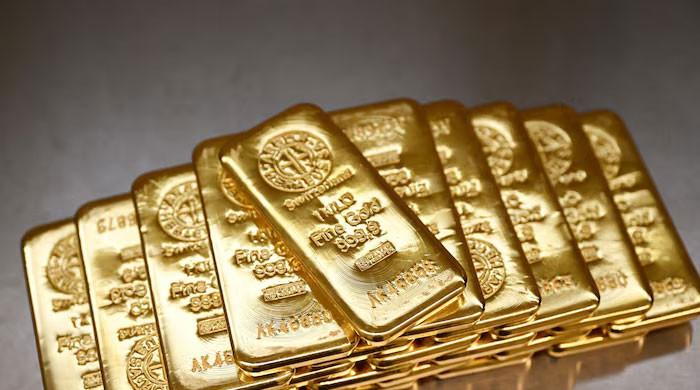Economic Survey 2021-22: Pakistan beats growth target as industries, services guide 'V-shaped' recovery
While Pakistan has achieved most of its targets set for the outgoing fiscal year, the country failed to beat the inflation target
June 09, 2022
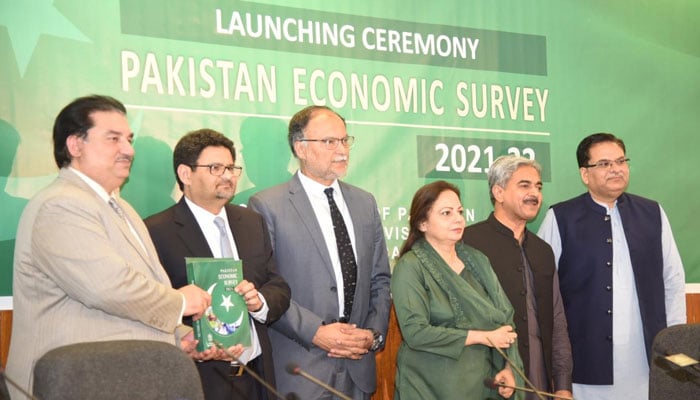
- Real GDP posts growth of 5.97%
- For July-April FY22, current account deficit remains $13.8bn
- Agriculture sector posts growth of 4.4%
- Industrial sector records growth of 7.2% in FY22
- Services sector still constitutes the largest share of 58% in GDP
- Total revenues increase by 17.7% and reach Rs5,874.2bn
ISLAMABAD: A day before announcing the budget for the fiscal year 2022-23, the coalition government reflected upon the performance of the economy for the outgoing fiscal year with a growth of 6% against the envisaged target of 4.8%.
Finance Minister Miftah Ismail, who succeeded Shaukat Tarin as the country’s finance czar in mid-April (which interestingly is when the survey review period ends), chaired the launch ceremony of the Economic Survey 2021-22.
"The situation in Pakistan has remained the same: whenever the country records growth, unfortunately, it falls into a crisis of current deficit,” Miftah said in a televised press conference.
The survey document released by the Ministry of Finance noted that though the economy recovered from the pandemic (a 0.94% drop in FY20) and maintained a V-Shaped recovery by posting real GDP growth of 5.97% in the fiscal year 2022, this high growth is "unsustainable" and has resulted in "financial and macroeconomic imbalances".
The survey also noted that provisional GDP growth has been estimated at 5.97% on the back of 4.4%, 7.19%, and 6.19% in the agriculture, industry, and services sector, respectively.
It is worth mentioning that the National Economic Council (NEC) has approved the annual targets for the upcoming fiscal year 2022-23, including the economic growth target set at 5%, along with the commitment to make efforts to raise it to 6%.
Pakistan's growth story
He said that historically, Pakistan’s economy had shown periodic boom-bust growth cycles. And the reasons for such volatile growth cycles included wide-ranging economic challenges like shrinking fiscal space, exchange rate pressure, mounting current account deficit, and inflation, among others.
“The same has happened this time as well. The recent 5.97% growth recorded during the outgoing fiscal year 2021-22, according to the new estimates, has pushed Pakistan towards the balance of payments and current account deficit crises,” the finance minister lamented.
He further highlighted imports have increased by 48%, as compared to the last fiscal year, while exports have also moved up, adding that the trade deficit stood at $45 billion.
'Forex reserves issue to be resolved by Tuesday'
"I assure you that by Tuesday next week, the issue of foreign exchange reserves will be resolved as the expected $2.4 billion will be transferred from China,” he said.
The finance minister added that former prime minister Imran Khan left "landmines" — referring to subsidies — for the incoming government and it was tantamount to "giving people cheques that would bounce".
"He knew that his government was going to be ousted, therefore, he left landmines for the next person to come in power — and that currently is Shehbaz Sharif [...] but now is the time to rectify Pakistan's economy."
Miftah said the coalition government had "saved Pakistan from defaulting", and from now, the country will witness "sustainable growth with responsibility".
The finance minister said the growth would be sustainable as the country would not repeatedly see a balance of payments crisis and current account deficit.
He said that in previous years, exports were around half of imports. However, the export-to-import ratio stands at 40:60 now, he continued, adding that Pakistan can only finance 40% of its imports through exports, and for the rest, it has to rely on remittances or loans — due to which the country remains stuck in a balance of payments crisis.
Agriculture
During FY22, the agriculture sector recorded a remarkable growth of 4.4% and surpassed the target of 3.5% and last year’s growth of 3.48%.
"This growth is mainly driven by high yields, attractive output prices and supportive government policies, better availability of certified seeds, pesticides, and agriculture credit," the survey document read.
The crops sector outperformed and posted a growth of 6.58% during FY22 against 5.96% last year. At the sub-sector level, important crops, other crops, and cotton ginning depicted a significant growth of 7.24%, 5.44%, and 9.19%, respectively, against last year’s growth of 5.83%, 8.27%, and -13.08%.
"We also need inclusive growth. We have always facilitated the elite so they could boost the industry and benefit the economy. This is one strategy, but when we provide privileges to the elite, our import basket gets heavier," he said.
"A rich person spends a lot on imported items as compared to a low-income person," he said, adding that the government should financially empower the low-income segments of society to boost local production.
"If we do this, then perhaps our domestic and agriculture production would increase, but it will not move up our import bill. This growth will be inclusive as well as sustainable," he said.
Pakistan misses inflation target
According to the Pakistan Economic Survey, for the outgoing fiscal year, the inflation target was set at 8%, but an "abnormal" increase in global commodity prices, especially crude and edible oils, has made domestic prices soar since Pakistan is a net importer of these essential items.
"It is the sixth consecutive month when the inflation rate has remained in the double-digits. Consumer Price Index (CPI) in April 2022 stood at 13.4% on a year-on-year basis which was up from 12.7% in the previous month and 11.1% in April 2021," the document showed.
Meanwhile, the pace of food inflation surged 15.6% in urban and 17.7% in rural during the month of April 2022. The CPI Inflation, recorded at 11% on average during July-April FY22 as against 8.6% in same period last year.
The finance minister added that since energy prices are too high in Pakistan, the local industry was "uncompetitive."
He said the supply of gas to all industries has resumed after being shut for some time, noting that it would not have been disrupted if the PTI government entered long-term agreements.
'State of Pakistan that is seeing an economic turmoil'
The previous government did not make long-term plans, forcing Pakistan to buy energy and oil at costlier rates, which is leading to the worsening economy, he said.
"And this is not PML-N, JUI-F, PPP, or the coalition government's economy whose economic situation is worsening; it is the state of Pakistan that is seeing an economic turmoil," he said.
The finance minister, talking about foreign direct investment (FDI), said it was around $2 billion in 2017-2018, but it stood at around $1.25 billion in the first nine months of the outgoing fiscal year.
Current account deficit
Miftah said the trade and current account deficits have increased as compared to 2017-18 — the fiscal year when PML-N's government ended — as an "incompetent" ruler was imposed on Pakistan.
Miftah said although coronavirus was once-in-a-lifetime pandemic, the government missed historic opportunities. "After COVID, oil and gas were at record-low rates, which the PTI government missed [taking advantage of]."
He noted that although lives were lost due to the pandemic, the country did not face much of a loss on the economic front as the G20 deferred the loan repayment of more than $4 billion and International Monetary (IMF) gave an additional $1.4 billion to Pakistan.
"The previous government did not consolidate it and couldn't capitalise on it," the finance minister said.
He slammed the PTI for "reducing the agricultural yield" as Pakistan now has to import wheat that it used to export before the PTI era.
Miftah stressed that since Pakistan is a nuclear country, its export-to-GDP rate should be 15%. "The problem in Pakistan is not that our import is a lot; the issue lies in our exports being less," he said.
Miftah blames PTI for taking 'historic' loans
The finance minister said the PTI government took "historic" loans during its tenure. Miftah added the government would be needing $3,100 billion for debt servicing this year and more than $3,900 billion next year.
'Rebasing of economy'
For his part, Minister for Planning, Development, and Special Initiatives Ahsan Iqbal said the PTI government had rebased the economy, therefore, the latest numbers did not represent the “true picture”.
The planning minister said his sector, development, has taken the biggest hit in this economic survey as public investment had gone down, which ultimately shrunk private investment.
Iqbal said PTI decreased the development budget gradually and when the coalition government came into power, it was brought down to Rs550 billion.
"This was a huge contrast between the budget that we last presented. We had aligned 'two Ds' — the defence and development budgets were Rs1,000 billion," Iqbal said.
The federal minister said the defence budget was not slashed for development, but record taxes were collected to meet the demands of both sectors.
Pakistan’s future depends on ‘strong defence’
Iqbal added that Pakistan's future depends on strong defence as well as development. He added that it was important to invest in education and create avenues of employment for the youth.
"If we do not do this, then an incident similar to the one that occurred in Karachi University will happen, where a woman, who was doing her MPhil, blew herself up. People facing poverty tend to move towards extremism," he said.
The planning minister recalled that during the PML-N's last tenure, the country was moving towards "vision 2025" when all of a sudden, we took a U-turn to "Naya Pakistan".
Iqbal said the coalition government was trying to bring the country back on track in terms of economic prosperity, but "at a price" — the revocation of subsidies.
He added that when the government was formed, it took one month to end the subsidies as it was trying to look for ways to refrain from shifting the burden on to the masses.
Iqbal says PM Shehbaz wants charter of economy
Iqbal said development stood at "0%" during PTI's tenure, and the current government wanted to revive the economy in its quest to invest in this sector.
Pakistan is "behind Bangladesh in every sector" despite Dhaka gaining independence 25 years after Islamabad, Iqbal said, noting that it was time the nation think about development seriously.
Iqbal said this is why Prime Minister Shehbaz Sharif is stressing over the need for a "national charter of economy".
He added that the Higher Education of Pakistan's (HEC) development budget was being increased by 67% and the China-Pakistan Economic Corridor (CPEC) was also being revived.




